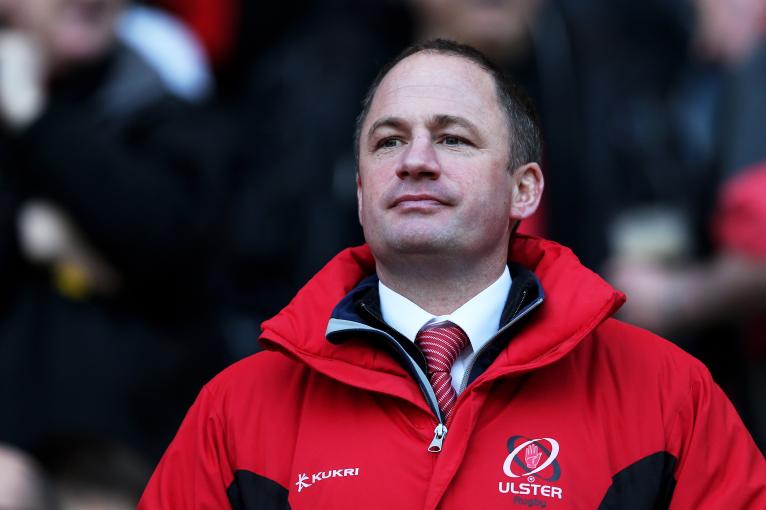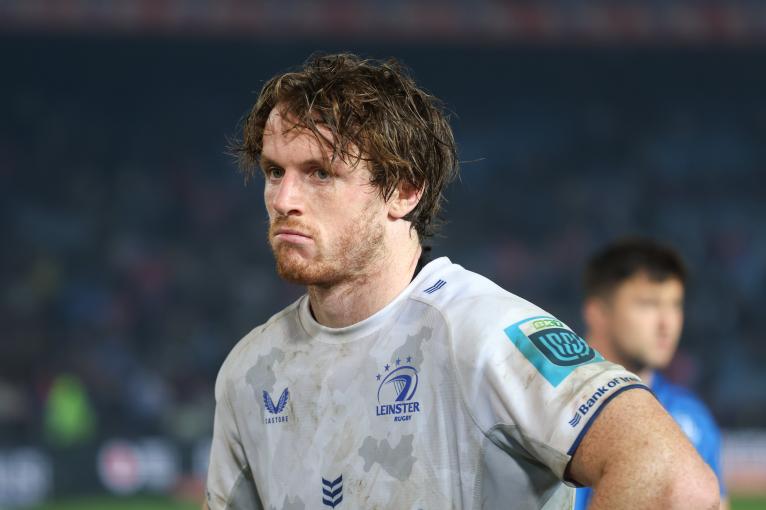First, the intro to the story. Just over a fortnight ago David Humphreys, fresh into the gap left by outgoing IRFU High Performance Director David Nucifora, greeted the media at the union’s nicely appointed suite on the halfway line at the Aviva Stadium.
It was a two for the price of one event: here, folks, is the IRFU Strategic Plan 2024-2028; and on hand to give it some gloss is a man who knows a thing or two about Irish rugby from school to club to province to country. And that’s before he put his jockstrap in the wash for the last time and got involved in the management side of the game. Since then he has worked at home and abroad in rugby and cricket, giving him a good handle on how to achieve altitude in high performance.
Two sequences spring to mind when David Humphreys pops up on our screen. For openers there is the slightly built, sharp-as-a-tack out-half who drove Ulster to their only – and Ireland’s first – European Cup, in the days before Heineken got on board. He was also on hand to press the accelerator against Scotland in 2000, coming on for debutant Ronan O’Gara, in a surge that kept Warren Gatland in the job for a while longer as Ireland coach.

Then there is the car crash interview in Ravenhill, in 2012, involving just two vehicles – Humphreys’ and Ulster coach Brian McLaughlin’s – yet felt like a multiple pile-up given the number of collisions in the space of one press conference. It was pinball meets rugby. At that point Humphreys was the boss at Ravenhill and wanted to sideline his head coach, whom he reckoned would be better utilised in the Academy. The awkward bit was that McLaughlin was en route to piloting Ulster to a Heineken Cup final, where they would be emptied by Leinster. Getting that podium finish didn’t save him.
Second, there was the story’s mid-section. The theme of the Strategic Plan launch was the passion of Humphreys for the chase: keeping Ireland among the world leaders and trying to steal a yard or two from somewhere.
The plan itself is noticeably short on detail, so they needed the new appointee to make an impression. He did well enough on the day, and you couldn’t have left that gathering thinking he’d be a hard man to get out of bed in the morning.
Leinster had a haunted look there against the Bulls in the URC. It was like they read the message on the dashboard, the info telling them the number of kilometres left in the tank didn’t match the ones on the road.
There was an unspoken understanding however, illustrative of our self-opinion as a rugby nation. Two days later Leinster and Munster would toe the line in their URC semi-finals against the Bulls and Glasgow respectively. We didn’t do a straw poll of those present in the Aviva, but we’d be surprised if the vast majority didn’t expect Thomond Park to be full for the URC final between Munster and Leinster. Instead, a surprise and unwelcome weekend off suddenly presented itself.
Whatever about Munster, who at least have the replica of last year’s URC trophy still in the cabinet, we wondered how the 18-strong Leinster contingent in the 35-man Ireland squad felt going through Dublin Airport a couple of days ago, bound for South Africa. It fits the story nicely that the opener on Saturday in the two Test series brings them back to Loftus Versfeld.
They had a haunted look there against the Bulls in the URC. It was like they read the message on the dashboard, the info telling them the number of kilometres left in the tank didn’t match the ones on the road. That meant different things to different people. Caelan Doris for example was played off the park by his opposite number Cameron Hanekom, yet managed to hang in there and finish strongly despite the fuel gauge.

On the other hand Ryan Baird, in short order, strung together three mistakes in that endgame, a period when whoever blinked was going to lose sight of the target. It was another example of Leinster unable to cope with adversity at the top end, either in Europe or the URC. So when the contest shifts from them going forward, playing with tempo and accuracy, looking like world beaters, to a breathlessly tight battle with ebbs and flows where the tension is palpable, they can’t solve the riddle.
This had direct relevance to a section in Humphreys’ view of the world, covered at the launch of the Strategic Plan. Unaware that the next example of Ireland’s shortage of X-factor was only hours away, he alluded to the handful of players who carried a point of difference as a trump card. He sounded like he wanted a handful in each province.
I don’t have an answer as to what our plan will be, but we will have a plan.
“We are very clear that we are a sport that has to continue to grow,” he said. “We are a sport that can’t rely on the private schools. They have always been central to producing players for Irish rugby long before the game went professional. Since going professional, they have been an increasingly important part. In my view, I wouldn’t say always but for the foreseeable future (they) will play that role.
“I go back to performance integration. We have to find a way. There’s no point of having a policy of looking for players when they’re 18-20. It’s almost passed them by. When you look at the Sevens programme, especially the women’s side, it’s a better way of bringing players in late because it’s much easier to understand. Once they get that understanding of that game, it’s a much easier transfer.”

Great, so he has identified a problem that has been obvious for years to anyone interested in looking. There has been no urgency around fixing this because Ireland’s system, backboned by the private schools, has been so good at producing players good enough to play at the top level. Its homogenous nature however means that so many of them look the same, sound the same and think the same way. Which is not really what you want when the problem in front of you is not covered in the instruction manual. So has David Humphreys a few sheets of A4 with the outline of a plan?
“I don’t have an answer as to what our plan will be, but we will have a plan,” he said.
We look forward to that. By the time it is produced, and if subsequently it bears fruit, Andy Farrell will have moved to a different phase of his life, or will be the longest serving coach in the history of rugby football.
By now surely we are at a point where the satisfaction of being pretty good at what we do, and better than most, is not good enough.
For now, Farrell is embarked on Act III of his compelling stage play: New Zealand in summer 2022 was a production in itself, an extraordinary success despite a dodgy start with lines forgotten and a few actors falling down; for Act II the scene moved to France, a thrilling World Cup narrative with a sadly familiar conclusion; and here we are now with another new setting and a very difficult crowd taking their seats. This is not on the same logistical scale as the New Zealand adventure, but it will be hugely demanding nonetheless.
The last time Ireland were in these parts it was 2016, Paddy Jackson was the star of the show and Joe Schmidt was the boss, with Farrell, the new face, as defence coach.
It was historic in delivering a first win over the Springboks on South African soil, coincidentally on the same day that Ireland’s Under-20s beat New Zealand for the first time.

Tests two and three were not so good. Farrell is still wedded to the idea that if the tour is not shifting you out of your comfort zone with a super shock cattle prod, then it’s worthless.
Which brings us to the outro. Recent events have put some distance between Ireland and their favourite snuggle. The collapse of Leinster and Munster has been, plain and simple, harrowing.
The absence of X-Men Jamison Gibson-Park and Mack Hansen leaves the tourists with only James Lowe, Dan Sheehan and Bundee Aki in the first-class cabin.
There are lots of lads down the stairs in business, and they reflect well on the imperfect system that produced them, but by now surely we are at a point where the satisfaction of being pretty good at what we do, and better than most, is not good enough.


Hyperbole. The Irish provinces were also in a tail spin going into the 2022 series in NZ. It ended well, though.
Imagine an Irish team without Kiwis or a Scottish team without South Africans…
6 nations —>4.5 nations
Would that be a level above or below a team ‘bonded’ by (discriminatory) racial quotas?
With the new 5 year resident rule it's harder to bring in foreigners to provide that point of difference
Not a problem when the u20 side have improved so much
Act 111 could well be a Irish tragedy of Shakespearian proportions?
Well there's 109 others to get through before that
Gibson Park huge loss. He’s excellent second only to Du Pont